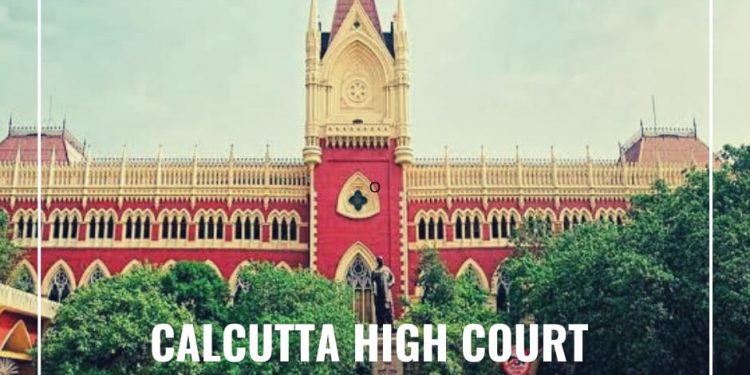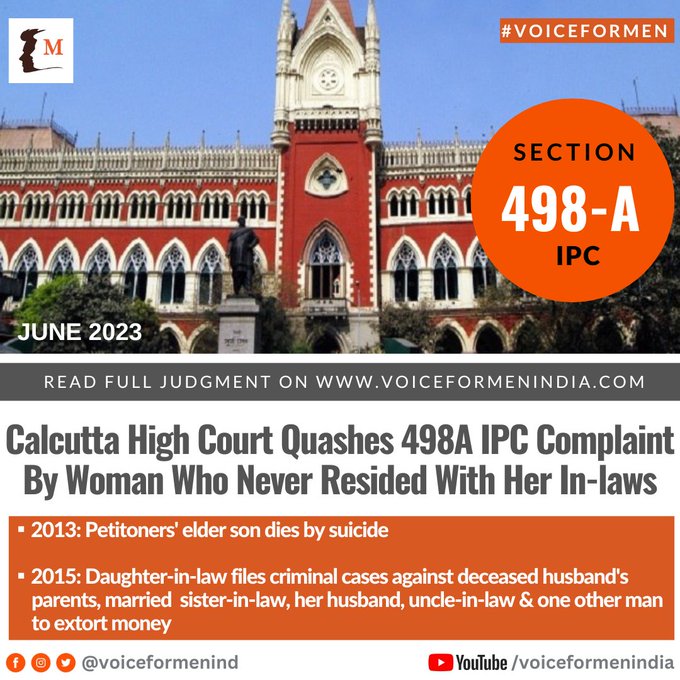The Calcutta High Court on June 08, 2023 quashed a domestic violence complaint filed by a woman against her in-laws while noting that the two parties never resided together.
Infact, the Calcutta High Court also noted that the woman had left her matrimonial home on January 20, 2015 and accused her in-laws of strangulating her to death on January 22, 2015.
Wife Turned Accident Into Her Attempt To Die By Suicide | Mumbai Court Acquits Husband, His Parents From 498A IPC After 9-Years
Case:
Subhas Chatterjee – elder son of the petitioner parents – got married to Sona Chatterjee in November 2006 according to Hindu rites and customs.
After the said marriage, Subhas and Sona started residing separately at a rented accommodation at Shyambandh, Burnpur, Asansol.
Subhas Chatterjee, was purportedly found hanging in his room in December 2013 and the cause of death was held to be suicide.
Daughter-in-law Files 498A Complaint Against In-laws
In February 2015, Sona lodges a complaint Sections 498A/406/325/307/376/511/120B/34 of the Indian Penal Code (IPC) against the petitioners i.e. Subhas’ parents and four others namely Tarun Ganguly (uncle-in-law), Sumita Banerjee (sister-in-law), Sumanta Banerjee (husband of Sumita Banerjee) and one Mohan Sharma accusing all of them of dowry harassment and domestic violence.
The petitioners then approached the High Court to quash these cases against them.
Hyderabad Techie Dies By Suicide After Parents & Self Were Arrested Under Section 498A Filed By Wife
Arguments by Petitioners
According to the petitioners, Sona did not allow their elder son to even keep in touch with them when he was alive and thus they had no contact whatsoever with the daughter-in-law as well. The petitoners claimed that Sona was residing with their son Subhas until his suicide, and then immediately after the death of her husband, she took all articles including her own belongings from their rented residence to her own paternal home.
Since the death of her husband, the daughter-in-law never resided with the petitioners. However, she began targeting the petitioners with the intention to extort money from them by threatening to falsely implicate them in criminal cases. The daughter-in-law, in connivance with notorious and anti-social elements of the society, began mentally and physically harassing the petitioners. The acts of the daughter-in-law, harassing the petitioners, went to such intolerable extent that the petitioners chose to sell their house and moved to their present address in Asansol District.
It was further submitted that even after the registration of the instant case, the daughter-in-law continued to threaten and intimidate the petitioners. She demanded Rs 8 lakh from the petitioners. On one occasion, she forced the petitioner to put their signatures on a blank piece of paper and extorted Rs 20 thousand from them.
Unable to bear the incessant torture and intimidation meted out by the daughter-in-law, the mother-in-law in 2015 preferred an application under Section 156(3) of the Code of Criminal Procedure, 1973 before the Learned Additional Chief Judicial Magistrate, Asansol and thereafter, pursuant to the direction of the Learned Magistrate, Asansol (S) under Sections 341/323/384/448/386/34 of the Indian Penal Code was registered against the daughter-in-law. The said case is still pending.
Feminist Portal The News Minute Dismisses Baiju Raju’s Suicide As His Mental Problem; Gives Clean Chit To Wife Justifying Adultery
Calcutta High Court
A single-judge bench of Justice Shampa Dutt (Paul) at the outset observed that the respondent (daughter-in-law) herself in her Section 164 CrPC statement said she had left her matrimonial home on 20.01.2015, but in her memorandum of complaint she claimed that her in-laws had tried to strangle her to death on 22.01.2015. Justice Dutt remarked,
Thus, from the materials on record it is clearly evident that the statement of the complainant in her petition of complaint is in total contradiction to her statements recorded under Section 164 Cr.P.C.
This is a fit case where the inherent power of the court should be exercised to prevent abuse of process of Court/law. In the present case there is no substance in the allegations and no material exists to prima facie make out the complicity of the petitioners in a cognizable offence and as such the proceedings in this case is liable to be quashed.
Kerala Man, Father, Die By Suicide After Wife Filed 498-A Case Against Husband & His Family
The bench further added,
The materials on record including the statement of the complainant under section 164 CrPC clearly show that the opposite party/wife never resided with the petitioners and thus the question of being inflicted with cruelty as defined/laid down under section 498A IPC does not arise.
The ingredients required to constitute the said offence is not present in the present case. It is thus seen that the materials in the case diary and the chargesheet there in, do not prima facie make out a case of cognizable offence against the accused/petitioners as alleged and there is no materials for proceeding against the accused/petitioners.
Quashing the charges against the petitioners, the Calcutta High Court concluded:
In the present case there is no substance in the allegations and no material exists to prima facie make out the complicity of the petitioners in a cognizable offence and as such the proceedings in this case is liable to be quashed.
LEAVE YOUR COMMENTS BELOW:
READ JUDGMENT: Calcutta HC Quashes #498A IPC Complaint By Woman Who Never Resided With Her In-laws
— Voice For Men India (@voiceformenind) June 13, 2023
▪️2013: Petitoners' elder son died by suicide
▪️2015: Daughter-in-law files criminal cases against deceased husband's parents/others to extort moneyhttps://t.co/S50RTMiBUI
MUST WATCH:
Don’t Issue Notice Directly To Distant Relatives Of Husband | Kolkata Man Wrongly Arrested In 498A
RELATED ARTICLES:
READ ORDER | Senior Citizen Has Right To Reside In His Own House; Son & Daughter-in-Law Are Licensees At Best
Woman Can Be Evicted From In-Laws’ House Under Senior Citizen Act Despite Protection From DV Act: Punjab & Haryana High Court
READ ORDER | Daughter-in-Law To Be Evicted From Matrimonial Home As Senior Citizen In-Laws Entitled To Live Peacefully & Not Be Haunted By Son’s Marital Discord
READ ORDER | Daughter-in-Law Who Obtained Compassionate Employment With Undertaking Bound To Maintain Mother-in-Law: Calcutta High Court
Join our Facebook Group or follow us on social media by clicking on the icons below
If you find value in our work, you may choose to donate to Voice For Men Foundation via Milaap OR via UPI: voiceformenindia@hdfcbank (80G tax exemption applicable)
































